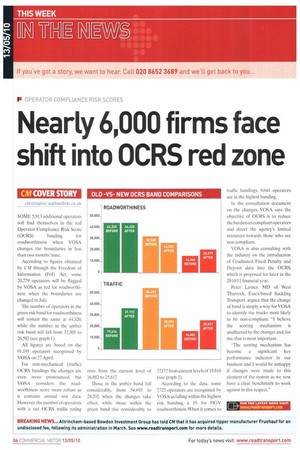Nearly 6,000 firms face shift into OCRS red zone
Page 6

If you've noticed an error in this article please click here to report it so we can fix it.
CM COVER STORY
christopher.waLton@rtn.co.uk SOME 5,913 additional operators will find themselves in the red Operator Compliance Risk Score (OCRS) banding for roadworthiness when VOSA changes the boundaries in less than two months' time.
According to figures obtained by CM through the Freedom of Information (FoI) Act, some 20.279 operators will be flagged by VOSA as red for roadworthiness when the boundaries are changed in July.
The number of operators in the green risk hand for roadworthiness will remain the same at 44,320, while the number in the amber risk band will fall from 32,505 to 26,592 (see graph 1).
All figures are based on the 91,191 operators recognised by VOSA on 27 April.
For non-mechanical (traffic) OCRS bandings the changes are even more pronounced, but VOSA considers the roadworthiness score more robust as it contains annual test data. However, the number of operators with a red OCRS traffic rating rises from the current level of 16,882 to 25,817 Those in the amber band fall considerably, from 54,693 to 28.202 when the changes take effect, while those within the green band rise considerably to 37,172 from current levels of 19,616 (see graph 2).
According to the data, some 7,723 operators are recognised by VOSA as falling within the highest risk banding, a 10, for HGV roadworthiness. When it comes to traffic bandings, 9,641 operators are in the highest handing.
In the consultation document on the changes, VOSA says the objective of OCRS is to reduce the burden on compliant operators and direct the agency's limited resources towards those who are non-compliant.
VOSA is also consulting with the industry on the introduction of Graduated Fixed Penalty and Deposit data into the OCRS, which is proposed for later in the 2010/11 financial year.
Peter Lamer, MD of West Thurrock, Essex-based Suckling Transport, argues that the change of band is simply a way for VOSA to identify the trucks most likely to be non-compliant: "I believe the scoring mechanism is unaffected by the changes and, for me, that is most important.
"The scoring mechanism has become a significant key performance indicator in our business and 1 would be unhappy if changes were made to this element of the system as we now have a clear benchmark to work against in this respect."
































































































































